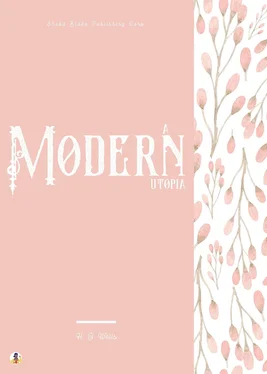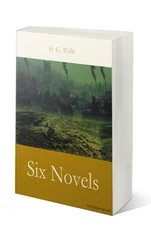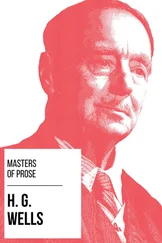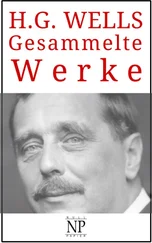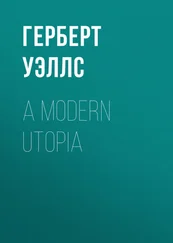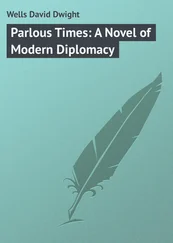And behold! in the twinkling of an eye we are in that other world!
We should scarcely note the change. Not a cloud would have gone from the sky. It might be the remote town below would take a different air, and my companion the botanist, with his educated observation, might almost see as much, and the train, perhaps, would be gone out of the picture, and the embanked straightness of the Ticino in the Ambri-Piotta meadows—that might be altered, but that would be all the visible change. Yet I have an idea that in some obscure manner we should come to feel at once a difference in things.
The botanist’s glance would, under a subtle attraction, float back to Airolo. “It’s queer,” he would say quite idly, “but I never noticed that building there to the right before.”
“Which building?”
“That to the right—with a queer sort of thing——”
“I see now. Yes. Yes, it’s certainly an odd-looking affair…. And big, you know! Handsome! I wonder——”
That would interrupt our Utopian speculations. We should both discover that the little towns below had changed—but how, we should not have marked them well enough to know. It would be indefinable, a change in the quality of their grouping, a change in the quality of their remote, small shapes.
I should flick a few crumbs from my knee, perhaps. “It’s odd,” I should say, for the tenth or eleventh time, with a motion to rise, and we should get up and stretch ourselves, and, still a little puzzled, turn our faces towards the path that clambers down over the tumbled rocks and runs round by the still clear lake and down towards the Hospice of St. Gotthard—if perchance we could still find that path.
Long before we got to that, before even we got to the great high road, we should have hints from the stone cabin in the nape of the pass—it would be gone or wonderfully changed—from the very goats upon the rocks, from the little hut by the rough bridge of stone, that a mighty difference had come to the world of men.
And presently, amazed and amazing, we should happen on a man—no Swiss—dressed in unfamiliar clothing and speaking an unfamiliar speech….
* * *
Before nightfall we should be drenched in wonders, but still we should have wonder left for the thing my companion, with his scientific training, would no doubt be the first to see. He would glance up, with that proprietary eye of the man who knows his constellations down to the little Greek letters. I imagine his exclamation. He would at first doubt his eyes. I should inquire the cause of his consternation, and it would be hard to explain. He would ask me with a certain singularity of manner for “Orion,” and I should not find him; for the Great Bear, and it would have vanished. “Where?” I should ask, and “where?” seeking among that scattered starriness, and slowly I should acquire the wonder that possessed him.
Then, for the first time, perhaps, we should realise from this unfamiliar heaven that not the world had changed, but ourselves—that we had come into the uttermost deeps of space.
* * *
We need suppose no linguistic impediments to intercourse. The whole world will surely have a common language, that is quite elementarily Utopian, and since we are free of the trammels of convincing story-telling, we may suppose that language to be sufficiently our own to understand. Indeed, should we be in Utopia at all, if we could not talk to everyone? That accursed bar of language, that hostile inscription in the foreigner’s eyes, “deaf and dumb to you, sir, and so—your enemy,” is the very first of the defects and complications one has fled the earth to escape.
But what sort of language would we have the world speak, if we were told the miracle of Babel was presently to be reversed?
If I may take a daring image, a mediaeval liberty, I would suppose that in this lonely place the Spirit of Creation spoke to us on this matter. “You are wise men,” that Spirit might say—and I, being a suspicious, touchy, over-earnest man for all my predisposition to plumpness, would instantly scent the irony (while my companion, I fancy, might even plume himself), “and to beget your wisdom is chiefly why the world was made. You are so good as to propose an acceleration of that tedious multitudinous evolution upon which I am engaged. I gather, a universal tongue would serve you there. While I sit here among these mountains—I have been filing away at them for this last aeon or so, just to attract your hotels, you know—will you be so kind——? A few hints——?”
Then the Spirit of Creation might transiently smile, a smile that would be like the passing of a cloud. All the mountain wilderness about us would be radiantly lit. (You know those swift moments, when warmth and brightness drift by, in lonely and desolate places.)
Yet, after all, why should two men be smiled into apathy by the Infinite? Here we are, with our knobby little heads, our eyes and hands and feet and stout hearts, and if not us or ours, still the endless multitudes about us and in our loins are to come at last to the World State and a greater fellowship and the universal tongue. Let us to the extent of our ability, if not answer that question, at any rate try to think ourselves within sight of the best thing possible. That, after all, is our purpose, to imagine our best and strive for it, and it is a worse folly and a worse sin than presumption, to abandon striving because the best of all our bests looks mean amidst the suns.
Now you as a botanist would, I suppose, incline to something as they say, “scientific.” You wince under that most offensive epithet—and I am able to give you my intelligent sympathy—though “pseudo-scientific” and “quasi-scientific” are worse by far for the skin. You would begin to talk of scientific languages, of Esperanto, La Langue Bleue, New Latin, Volapuk, and Lord Lytton, of the philosophical language of Archbishop Whateley, Lady Welby’s work upon Significs and the like. You would tell me of the remarkable precisions, the encyclopaedic quality of chemical terminology, and at the word terminology I should insinuate a comment on that eminent American biologist, Professor Mark Baldwin, who has carried the language biological to such heights of expressive clearness as to be triumphantly and invincibly unreadable. (Which foreshadows the line of my defence.)
You make your ideal clear, a scientific language you demand, without ambiguity, as precise as mathematical formulae, and with every term in relations of exact logical consistency with every other. It will be a language with all the inflexions of verbs and nouns regular and all its constructions inevitable, each word clearly distinguishable from every other word in sound as well as spelling.
That, at any rate, is the sort of thing one hears demanded, and if only because the demand rests upon implications that reach far beyond the region of language, it is worth considering here. It implies, indeed, almost everything that we are endeavouring to repudiate in this particular work. It implies that the whole intellectual basis of mankind is established, that the rules of logic, the systems of counting and measurement, the general categories and schemes of resemblance and difference, are established for the human mind for ever—blank Comte-ism, in fact, of the blankest description. But, indeed, the science of logic and the whole framework of philosophical thought men have kept since the days of Plato and Aristotle, has no more essential permanence as a final expression of the human mind, than the Scottish Longer Catechism. Amidst the welter of modern thought, a philosophy long lost to men rises again into being, like some blind and almost formless embryo, that must presently develop sight, and form, and power, a philosophy in which this assumption is denied. [Footnote: The serious reader may refer at leisure to Sidgwick’s Use of Words in Reasoning (particularly), and to Bosanquet’s Essentials of Logic, Bradley’s Principles of Logic, and Sigwart’s Logik; the lighter minded may read and mark the temper of Professor Case in the British Encyclopaedia, article Logic (Vol. XXX.). I have appended to his book a rude sketch of a philosophy upon new lines, originally read by me to the Oxford Phil. Soc. in 1903.]
Читать дальше
